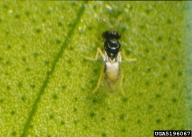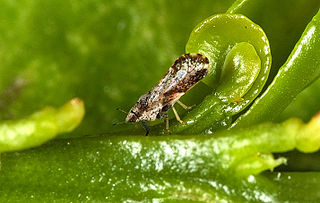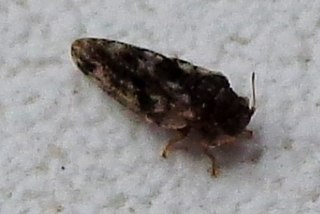
Psyllidae, the jumping plant lice or psyllids, are a family of small plant-feeding insects that tend to be very host-specific, i.e. each plant-louse species only feeds on one plant species (monophagous) or feeds on a few closely related plants (oligophagous). Together with aphids, phylloxerans, scale insects and whiteflies, they form the group called Sternorrhyncha, which is considered to be the most "primitive" group within the true bugs (Hemiptera). They have traditionally been considered a single family, Psyllidae, but recent classifications divide the group into a total of seven families; the present restricted definition still includes more than 70 genera in the Psyllidae. Psyllid fossils have been found from the Early Permian before the flowering plants evolved. The explosive diversification of the flowering plants in the Cretaceous was paralleled by a massive diversification of associated insects, and many of the morphological and metabolic characters that the flowering plants exhibit may have evolved as defenses against herbivorous insects.

The Sternorrhyncha suborder of the Hemiptera contains the aphids, whiteflies, and scale insects, groups which were traditionally included in the now-obsolete order "Homoptera". "Sternorrhyncha" refers to the rearward position of the mouthparts relative to the head.

Psylloidea is a superfamily of true bugs, including the jumping plant lice and others which have recently been classified as distinct families. Though the group first appeared during the Early Jurassic, modern members of the group do not appear until the Eocene, and Mesozoic members of the order are usually assigned to the possibly paraphyletic family Liadopsyllidae.

Tamarixia is a genus of hymenopteran insects of the family Eulophidae, they are parasitoids of Jumping plant lice or psyllids of the superfamily Psylloidea, although some species will parasitise aphids. Most species appear to be ectoparasitoids but at least one species has been recorded as an endoparasitoid.
Eurotica is a genus of jumping plant lice in the subfamily Aphalarinae and tribe Xenaphalarini, erected by Loginova in 1962.

Triozidae is one of seven families collectively referred to as jumping plant lice. They have traditionally been considered part of a single family, Psyllidae, but recent classifications divide the group into a total of seven families; most of the genera remain in the Psyllidae, but Triozidae is the second-largest family in the group, containing 27 genera, and a number of pest species.
Aacanthocnema is a genus of bugs from the jumping plant lice family (Triozidae). The genus is endemic to Australia, and currently contains six species, found in all states and territories with the exception of the Northern Territory.

Diaphorina is an Old World genus of sap-sucking hemipteran bugs in the family, Liviidae. It includes an important pest of citrus: the Asian citrus psyllid, D. citri.
Crnoklište is a village in the municipality of Pirot, Serbia. According to the 2002 census, the village has a population of 338 people.

Aphalaridae is a bug family in the superfamily Psylloidea.

Homotomidae is a family of small phloem-feeding bugs in the superfamily Psylloidea, or jumping plantlice.
Rhinocolinae is a subfamily of jumping plant louse in the family Aphalaridae.
Togepsyllinae is a bug subfamily of jumping plant-lice in the family Aphalaridae.

Aphalarini is a tribe of jumping plant lice (psyllid) in the subfamily Aphalarinae, first described by Franz Löw in 1879.
Calinda muiscas is a species of jumping plant lice of the genus Calinda in the family of Triozidae. The species was first described in 1997 by Olivares and Burckhardt.
John Stuart Noyes is a Welsh entomologist.
Platycorypha nigrivirga is an insect.

Liviidae is a family of plant-parasitic hemipterans in the order Hemiptera. There are more than 20 genera and 370 described species in Liviidae.
Spanioneura fonscolombii, is a species of plant-parasitic psyllid in the family Psyllidae which feed on box. It was first described by Arnold Förster in 1848 and is found in Europe. It is also found in the United States of America where it was accidentally introduced.
Liadopsyllidae is an extinct family of hemipteran insects belonging to Psylloidea ranging from the Early Jurassic to Upper Cretaceous. The family was named by Andrey Vasilyevich Martynov in 1926. They are the earliest known members of Psylloidea, with modern members of the group not known until the Paleogene, as such, they have been suggested to be a paraphyletic assemblage ancestral to modern psylloids. The family Malmopsyllidae has been subsumed into this family, but is considered distinct by some authors.









